- Business Acumen: Meaning & Elements
- Importance of Business Acumen in the Workplace
- Business Acumen Skills
- The Role of Emotional Intelligence in Business Acumen
- How to Develop Business Acumen?
- Advanced Strategies to Gain Business Acumen
- Showcasing Business Acumen
- Frequently Asked Questions
Business Acumen: What Is It & How To Develop It In Your Employees
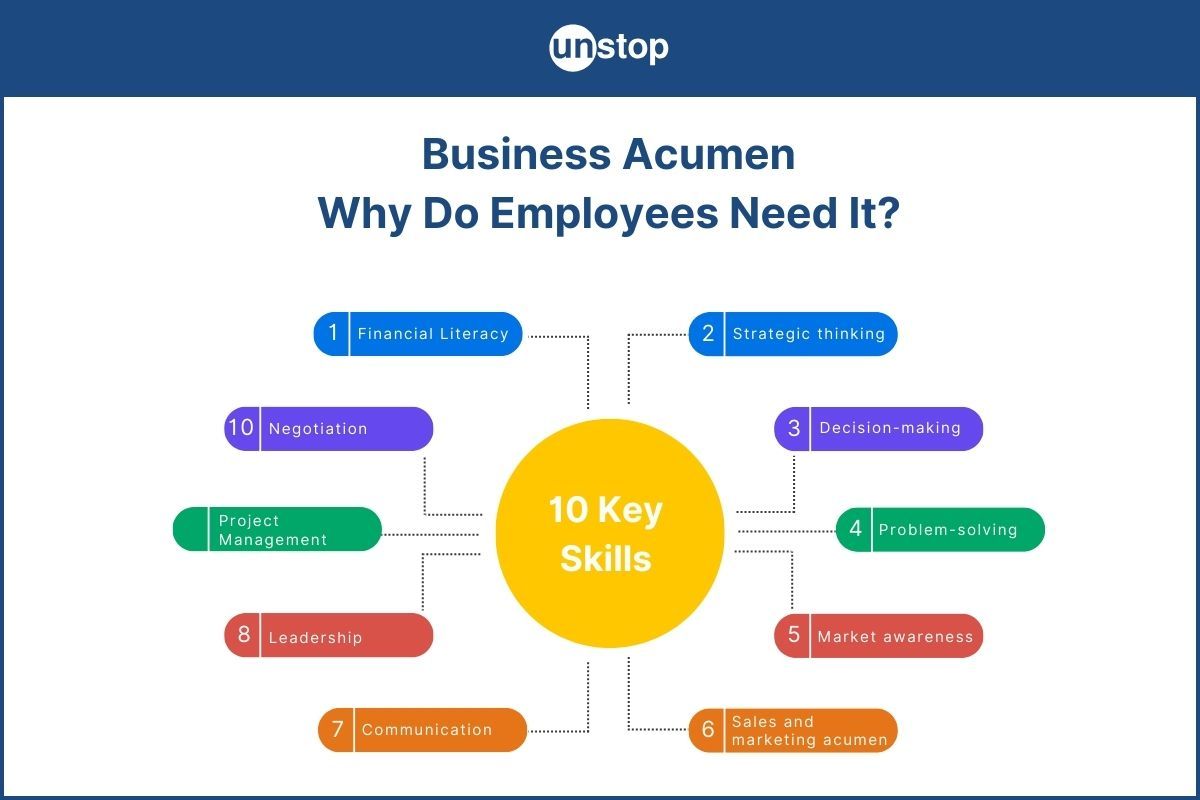
With organizations competing to adapt to emerging technologies, the one thing that can set them apart is investing in human capital. Technology can be the same across organizations, but it’s the people using that technology that can mean the difference between imitation and innovation.
One of the most important ways to invest in human capital, i.e., your workforce, is by helping employees at all levels develop business acumen skills.
Unless employees are aware of what’s driving profits, how are different objectives being prioritized, or what defines the bottom line, they won’t be able to contribute effectively to organizational success.
Developing business acumen not only enhances one's ability to contribute to projects and initiatives but also positions individuals for career advancement. By gaining knowledge about various aspects of a company, such as its vision, objectives, and relationships among team members, professionals can contribute meaningfully to the organization's success.
Let’s understand what is business acumen, what are key business acumen skills, and how can organizations help employees develop it.
Business Acumen: Meaning & Elements
What is Business Acumen?
Business acumen means having the ability to make sound and effective business decisions. It encompasses a range of skills and knowledge that enable individuals to understand financials, analyze market dynamics, and think strategically. With business acumen, professionals can navigate complex challenges, identify growth opportunities, and drive organizational growth.
Key Elements of Business Acumen
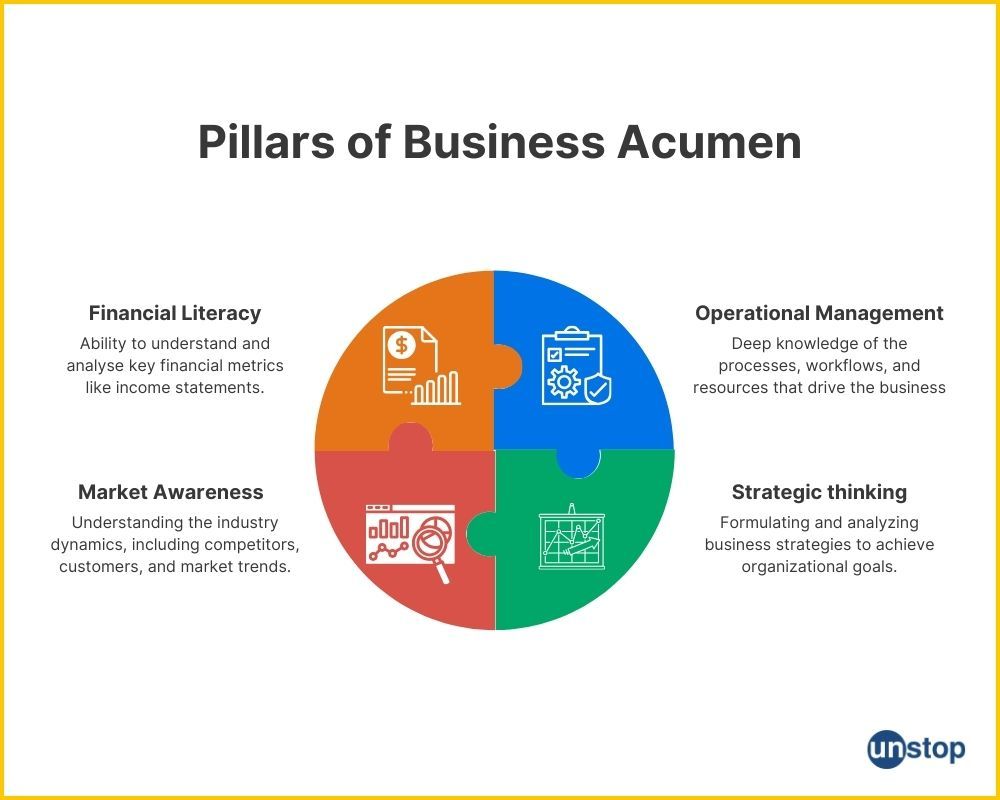
The three key elements of business acumen are financial literacy, operational management, and strategic thinking.
Financial literacy is the ability to interpret financial statements, such as income statements and balance sheets, to assess the financial health of a company. By analyzing key financial metrics like revenue, expenses, and profit margins, individuals can make informed decisions about resource allocation, budgeting, and investment strategies. Individuals can also create accurate budgets that align with the organization's goals and objectives. They can also forecast future financial outcomes based on market trends and make strategic decisions regarding resource allocation.
For instance, by analyzing cash flow patterns, businesses can determine when to invest in new equipment or hire additional staff.
Operational management refers to the supervision and control of the daily activities of a company to ensure efficient and effective operations. It is a pillar of business acumen because it focuses on optimizing processes, managing resources, and improving productivity, bridging the gap between strategy and execution.
For example, in a manufacturing company, operational management involves monitoring production schedules, coordinating inventory levels, and implementing quality control measures to streamline operations and maximize profitability.
Strategic thinking is when individuals can see the bigger picture and align short-term actions with long-term goals. Professionals with strategic acumen can develop comprehensive plans that consider various factors such as market conditions, competitive landscape, customer needs, and internal capabilities. This enables them to drive sustainable growth and give a competitive edge in the market.
For example, understanding customer preferences through market research improves businesses' ability to cater their products and services to customers.
Apart from these three key elements, it’s also imperative to understand market dynamics. This includes staying updated on industry trends, competitors' activities, customer preferences, and emerging technologies. By monitoring these factors closely, professionals with business acumen can identify opportunities for innovation or expansion while mitigating potential risks.
For example, Individuals may recognize a growing trend in mobile payments and advise the business to invest in developing a mobile payment app, giving them a competitive advantage in the market.
Importance of Business Acumen in the Workplace
Here’s how business acumen benefits individuals and organizations:
Individual Benefits:
- Increased job satisfaction and engagement: When employees understand the bigger picture of the business and how their role contributes to it, they feel more connected to their work and are more likely to be engaged and motivated.
- Enhanced decision-making: Business acumen equips employees to make informed decisions in their day-to-day work by giving them access to required skills and knowledge. This leads to better results and increased autonomy.
- Improved career prospects: Employees with strong business acumen display the skills and expertise that will get them promoted to leadership roles faster than others.
- Greater adaptability and resilience: In today's fast-paced business environment, understanding the market, competition, and financial factors allows employees to adapt to changes and thrive in uncertain situations.
Organizational Benefits:
- Improved performance and efficiency: Employees with business acumen are better equipped to identify and solve problems, streamline processes, and contribute to overall organizational efficiency.
- Enhanced innovation and creativity: Understanding the business landscape allows employees to identify opportunities for innovation and contribute to the development of new products, services, or strategies.
- Stronger customer focus: Employees who understand the business's customer base and value proposition are better able to build strong relationships with the customers and provide improved customer service.
- Understanding impact on the bottom line: Business acumen enables individuals to grasp how their work directly influences the company's bottom line. It can thus lead to better decision-making in areas like resource allocation, cost management, and investment, ultimately impacting the organization's financial health.
- Enhanced risk management: Employees with business acumen are more aware of potential risks and can help the organization mitigate them proactively. Individuals who possess this skill set are better equipped to make sound judgments based on data-driven insights, that mitigate risks and maximize growth opportunities.
Overall, cultivating business acumen in employees creates a win-win situation. Employees gain valuable skills and knowledge that benefit their careers, while organizations experience increased performance, innovation, and overall success.
Business Acumen Skills
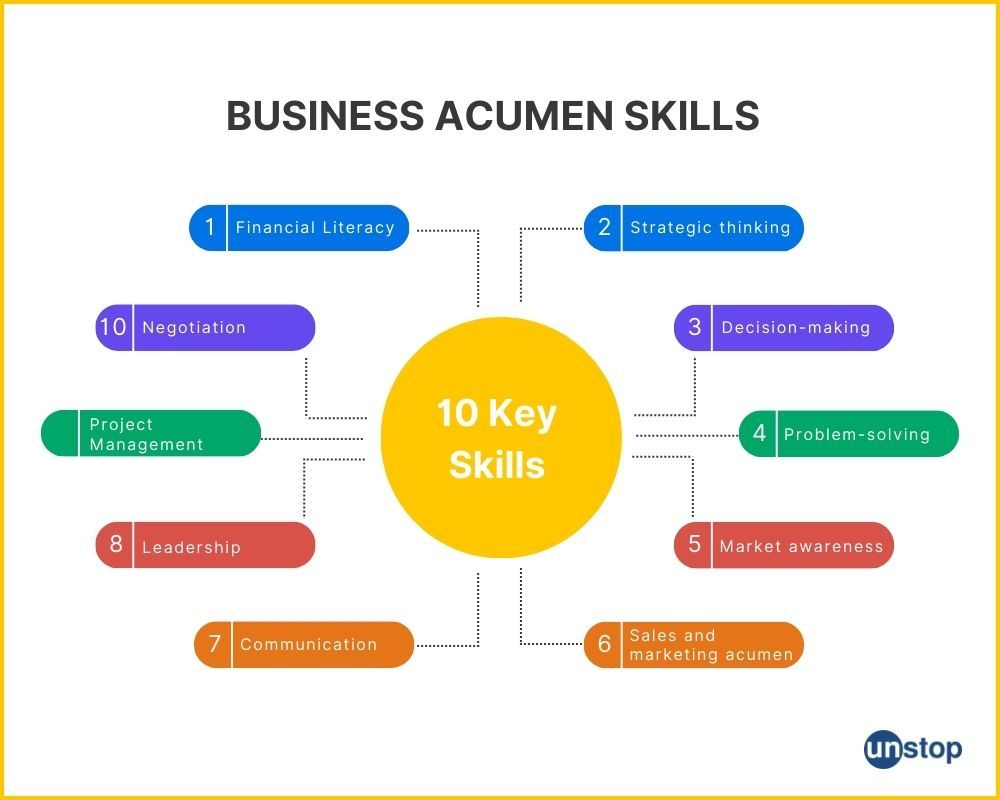
Here are some must-have business acumen skills that organizations should help employees cultivate:
- Financial literacy: Understanding financial statements, budgeting, and financial analysis.
- Strategic thinking: The ability to think long-term and make decisions that align with overall business goals.
- Problem-solving Identifying issues, analyzing data, and developing effective solutions.
- Market awareness: Staying informed about industry trends, customer needs, and competitor activities.
- Decision-making: Evaluating options and making informed choices based on available information.
- Leadership: Inspiring and guiding teams to achieve organizational objectives.
- Communication: Effectively conveying ideas and information to stakeholders.
- Negotiation skills: Finding mutually beneficial solutions in business deals and partnerships.
- Project management: Planning, organizing, and executing projects to achieve desired outcomes.
- Sales and marketing knowledge: Understanding customer behavior, market segmentation, and promotional strategies.
The Role of Emotional Intelligence in Business Acumen
Here’s why emotional intelligence plays a crucial role in developing business acumen:
Strong Customer Relationships
Emotional intelligence helps individuals understand customer needs and build strong relationships with them. By being attuned to the emotions and desires of customers, professionals can tailor their products or services to meet specific demands. This understanding allows businesses to provide personalized solutions that resonate with their target audience.
Empathetic Decision-making
Individuals with high emotional intelligence can analyze challenging scenarios from multiple perspectives, considering both logical and emotional factors. This skill enables them to make empathetic decisions that take into account the needs and concerns of all stakeholders involved.
Enhanced Communication and Collaboration
Professionals who possess strong emotional intelligence skills can effectively express their thoughts and ideas while actively listening to others. This fosters an environment where team members feel valued, leading to increased productivity, creativity, and overall success.
How to Develop Business Acumen?
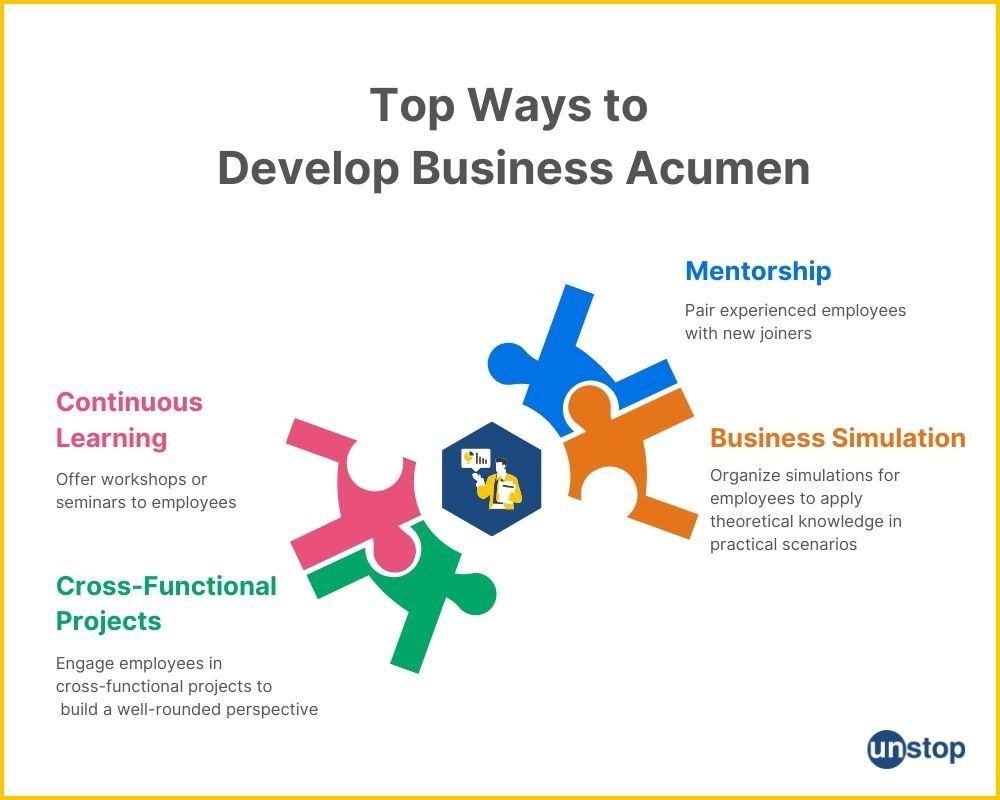
Continuous Learning
Continuous learning and staying updated with industry trends are essential for developing business acumen skills. Organizations can offer workshops or seminars on topics like finance, marketing, operations, and strategy. By staying informed about the latest developments in their field, individuals can enhance their understanding of business situations and problems.
Mentorship
Mentorship from experienced professionals is another effective way to enhance business acumen skills. Mentors can provide guidance, share their expertise, and offer valuable insights into navigating complex business scenarios. Experienced employees or industry experts can be paired with newer ones as mentors, to share knowledge and insights.
Cross-Functional Projects
Engage employees in cross-functional projects to provide valuable insights into different aspects of the business. Working on projects that involve collaboration across departments allows individuals to develop a holistic view of the company's operations and understand how different functions interact. This exposure helps build a well-rounded perspective and enables individuals to make more informed decisions that align with the organization's goals.
Business Simulation
Participating in business simulation games or case studies can be highly beneficial for developing business acumen skills. These activities provide opportunities to apply theoretical knowledge in practical scenarios, allowing individuals to analyze complex business problems and make strategic decisions based on real-world data.
Find business simulations across the three pillars of business acumen, marketing, strategy and finance, on Unstop.
Advanced Strategies to Gain Business Acumen
Executive Education Programs
Executive education programs are specifically designed to provide advanced skills and knowledge in areas such as finance, strategy, and leadership. Through interactive workshops, case studies, and expert-led sessions, participants gain a deep understanding of complex business concepts. This hones their critical thinking skills, necessary for strategic decision-making.
Networking with Industry Professionals
Engaging with industry professionals allows individuals to tap into a wealth of knowledge and gain insights from those who have already achieved success in their respective fields. By attending conferences, industry events, or joining professional associations, employees can connect with like-minded individuals who share similar goals and challenges. These connections provide opportunities for mentorship, collaboration on strategic initiatives, and access to valuable resources that can further enhance their business acumen.
Taking on Challenging Projects or Assignments
Stepping outside of one's comfort zone is an effective way to foster business acumen. Challenging assignments that push individuals beyond their current skill set can develop new perspectives and expand their capabilities. This could involve leading cross-functional teams, spearheading strategic initiatives, or tackling complex problems within the organization. The exposure to different aspects of the business landscape helps employees develop a holistic understanding of how various functions interconnect and impact overall organizational success.
Showcasing Business Acumen
Here’s how individuals can showcase business acumen:
On resumes
To showcase business acumen on resumes, individuals should highlight their relevant experience and accomplishments in the business world. This can include detailing specific projects they have successfully managed, demonstrating their ability to analyze financial data and make strategic decisions, and showcasing their leadership skills.
Additionally, including any certifications or advanced degrees related to business can also help demonstrate a strong understanding of the field.
During job interviews
During job interviews, individuals can showcase their business acumen by providing concrete examples of how they have successfully solved complex business problems in the past. They should discuss their ability to analyze data, identify trends, and make informed decisions based on that information.
Additionally, highlighting their ability to think strategically, communicate effectively, and collaborate with others to achieve business goals can also help demonstrate their business acumen.
At the workplace
To showcase business acumen at the workplace, individuals should consistently demonstrate their ability to understand and contribute to the overall goals and objectives of the organization. This can include actively seeking out opportunities to improve processes and drive efficiency, staying informed about industry trends and competitors, and making data-driven decisions that align with the company's strategic direction.
Additionally, individuals can showcase their business acumen by effectively communicating ideas and recommendations to colleagues and stakeholders, demonstrating their understanding of the broader business context.
In conclusion, developing strong business acumen skills is essential for success in the workplace. Business acumen encompasses a range of skills, including financial literacy, strategic thinking, and emotional intelligence, which are crucial for navigating the challenges of today's business landscape.
Frequently Asked Questions
Q1. What is business acumen and why is it important?
Business acumen is the ability to understand and apply key business principles, such as financial literacy, strategic thinking, and problem-solving skills. It is crucial in making informed decisions, driving growth, and achieving success in the workplace. Developing business acumen empowers individuals to navigate complex business environments with confidence.
Q2. How can I develop my business acumen skills?
To enhance your business acumen skills, consider engaging in activities like reading industry publications, attending relevant workshops or seminars, seeking mentorship from experienced professionals, analyzing case studies, and actively participating in cross-functional projects. Continuously learning about various aspects of business will contribute to your overall development.
Q3. What role does emotional intelligence play in business acumen?
Emotional intelligence encompasses self-awareness, empathy, effective communication, and relationship-building skills. By understanding emotions and managing interpersonal dynamics effectively, individuals can make better decisions that positively impact their organizations.
Q4. What are the pillars of business acumen?
The pillars of business acumen include operations management (ensuring efficient processes), financial management (understanding financial statements and making sound decisions), and strategic management (aligning actions with long-term goals). A solid foundation in these areas enables individuals to comprehend the holistic functioning of an organization.
Q5. What are some advanced strategies for building business acumen?
Senior executives or mid-career leaders can focus on expanding their knowledge through executive education programs or pursuing advanced degrees like an MBA. Seeking opportunities for cross-functional experiences within their organizations allows them to gain exposure to different aspects of the business. Networking with industry experts helps broaden perspectives and acquire valuable insights.
Suggested Reads:
I’m a reader first and a writer second, constantly diving into the world of content. If I’m not writing or reading, I like watching movies and dreaming of a life by the beach.
Login to continue reading
And access exclusive content, personalized recommendations, and career-boosting opportunities.
Subscribe
to our newsletter
Blogs you need to hog!

Organize Hackathons: The Ultimate Playbook With Past Case Studies

What is Campus Recruitment? How To Tap The Untapped Talent?
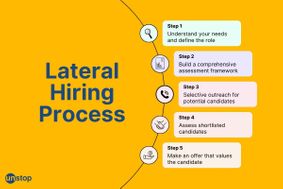
Lateral Hiring: A Complete Guide To The Process, Its Benefits, Challenges & Best Practices
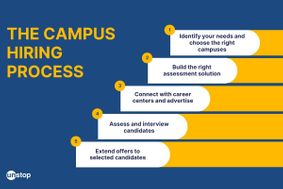









Comments
Add comment